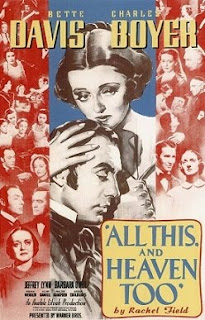Yesterday, I had a chance to watch another classic from 1940's Best Picture ballot...

.jpg)

The Philadelphia Story
Director:
George Cukor
Screenplay:
Donald Ogden Stewart
(based on the play by Philip Barry)
Starring:
Cary Grant, Katharine Hepburn, James Stewart, Ruth Hussey, John Howard
Academy Awards:
6 nominations
2 wins, including Best Actor (Stewart)
Tracy Lord (Hepburn) is an upper-class socialite set to wed the dependable George Kittredge (Howard). Tracy's ex-husband, the arrogant yet suave C.K. Dexter Haven (Grant), shows up the day before the nuptials to stir up some trouble. He brings with him a reporter Macaulay Connor (Stewart) and a photographer Liz Imbrie (Hussey), who are both introduced as "friends of the family" in order that they can secretly cover the wedding of the year. But the evening brings a few surprises, mostly induced by the flow of alcohol, and with three men in her vicinity, Tracy begins to doubt where her affections truly lie.
The entertainment value of The Philadelphia Story lies mostly within its words and its performances. Another adaptation of a stage play, the picture unsurprisingly sees very little action and an abundance of dialogue. Indeed, once the main plot has been set up, not much happens other than conversation. Fortunately, all this talk is delightfully witty, with such gems as Tracy's line regarding her first marriage, "I thought it was for life, but the nice judge gave me a full pardon." Additionally, the words are delivered in a typically effective fast-paced manner. Thus, despite the lack of major activity, there are no lulls and the film feels a lot shorter than it is. The ending may feel a touch too neat, but this is a romantic comedy, after all, so it is an appropriate conclusion, sure to put a heartwarming smile on the faces of fans of the genre.
.jpg)
The three leads are a major reason why this picture has remained such a classic. Grant, Hepburn and Stewart (pictured) are all at the top of their respective games. Stewart, in particular, provides plenty of laughs with his adorable drunken behaviour. Ruth Hussey successfully holds her own amongst that famous trio. Playing Tracy's younger sister Dinah is Virginia Weidler, also seen in another 1940 Best Picture nominee All This, and Heaven Too. Here, she proves her talent, delivering a mature performance, including a delightful rendition of one of Groucho Marx's signature tunes, Lydia the Tattooed Lady.

.jpg)

.jpg)

.jpg)







